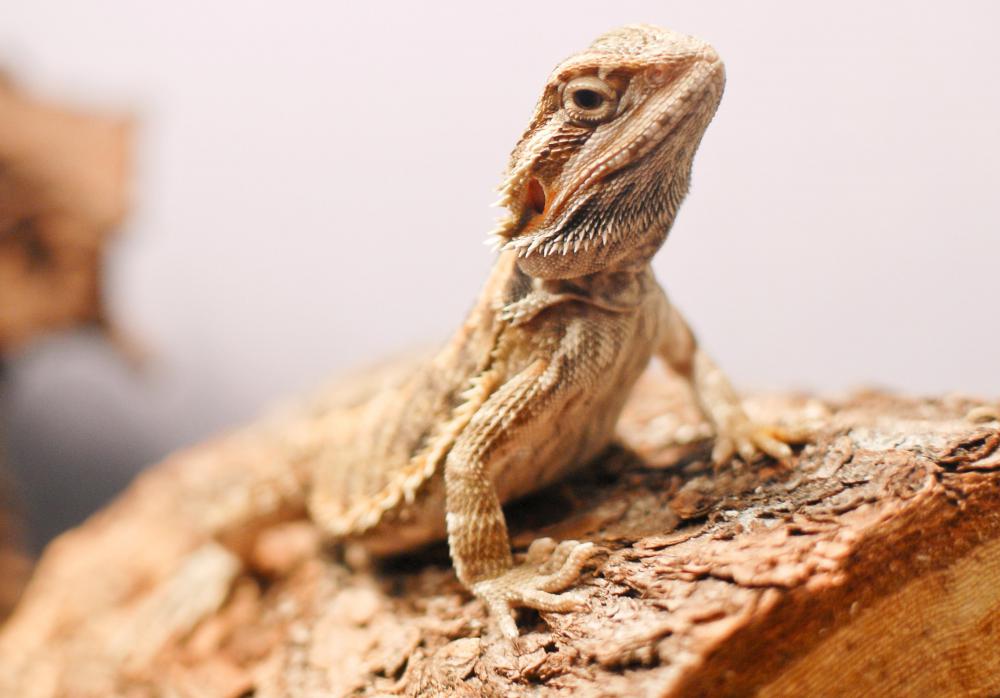At AllThingsNature, we're committed to delivering accurate, trustworthy information. Our expert-authored content is rigorously fact-checked and sourced from credible authorities. Discover how we uphold the highest standards in providing you with reliable knowledge.
What Do I Do If My Bearded Dragon Won't Eat?
Bearded dragons are wondrous, mysterious little creatures who can drive their human parents to distraction when they roll their lizard eyes at a cricket or a lettuce leaf. Lacking both the brainpower required to master English and the right oral configuration to pronounce most English words, when a bearded dragon won’t eat, it really can’t explain why. That means a lizard owner needs to do some basic sleuthing to determine if the dragon is feeling anxious, if habitat conditions need adjusting, or if it’s time to take the critter to the vet for a checkup.
Many types of lizards are a little on the not-so-touchy-feely side, and bearded dragons are especially sensitive to too much stress. While it’s fine for lizard lovers to lift their dragons out of the cage for a little scaly cuddle now and then, it’s important not to overdo it. Too much closeness makes a dragon want to breathe fire, and when there’s that much stress, it will often lose the desire for chow, and the bearded dragon won’t eat.

If there’s just too much activity going on around a bearded dragon’s environment, stress can also occur. If the cage is in a location where kids, dogs, and cats regularly tear through or stop by for a visit, the dragon probably won’t feel too secure. One thing an owner can do to make the habitat a little more comforting is to cover the sides of the cage. It might seem logical to move the cage, but because these little guys are creatures of habit, that can actually backfire into a full-fledged hunger strike.

Baby bearded dragons shouldn’t be housed with the big guys. Smaller dragons will refuse food if they feel intimidated by bigger brothers and sisters. The cage must be clean, as well, because a filthy environment is enough to put any lizard off its feed.
The environment bearded dragons require is very specific. The wrong temperature or too much humidity can be enough to make the lizard want to crawl under a rock. When a bearded dragon won’t eat, it often turns out to be caused by an environmental problem. They need higher daytime temperatures with part of the cage in shade. Ninety-five to 110 degrees Fahrenheit (35 to 43 degrees Celsius) is de rigueur, and a flat rock upon which to sprawl and bask is something every bearded dragon needs.

If the bearded dragon won’t eat despite all these requirements being addressed, it’s time for a visit to the vet. Possibly, the beast is simply going through a dormant period. If so, the vet can offer instructions for how to facilitate a little rest and relaxation. It’s also possible, however, the lizard is suffering from an illness or disorder that will require medical attention.
Frequently Asked Questions
Why is my bearded dragon not eating?
Bearded dragons may refuse food due to various reasons such as stress, improper habitat temperatures, illness, or a diet that lacks variety. Stress can be caused by changes in their environment or handling. Ensuring a proper thermal gradient in their enclosure—between 75-85°F with a basking spot of 95-110°F—is crucial for their digestion. If these factors are in check, a veterinary check-up may be necessary to rule out health issues.
How long can a bearded dragon go without eating?
Adult bearded dragons can survive for longer periods without food compared to juveniles, often up to two weeks. However, this is not ideal, and prolonged fasting can lead to health problems. Juveniles, on the other hand, should eat daily due to their rapid growth and higher metabolic rates. If a bearded dragon refuses food for more than a few days, it's important to investigate the cause.
What should I do if my bearded dragon won't eat vegetables?
Bearded dragons may sometimes show a preference for insects over vegetables. To encourage a balanced diet, try offering a variety of vegetables and occasionally mix them with their favorite insects to pique their interest. Gradually reduce the number of insects to shift their focus to vegetables. Offering finely chopped veggies or those with different colors and textures can also help stimulate their appetite for greens.
Can I force-feed my bearded dragon if it's not eating?
Force-feeding should only be done under the guidance of a veterinarian, as it can cause stress and injury to your bearded dragon. If your pet is not eating, it's better to address the underlying cause. A vet can provide a proper diagnosis and treatment plan, which may include syringe-feeding with a liquid diet if necessary, but this should not be attempted without professional advice.
How can I tell if my bearded dragon is sick or just not hungry?
Signs of illness in bearded dragons include lethargy, weight loss, sunken eyes, and abnormal feces. If your bearded dragon is not eating but otherwise appears active and healthy, it may just be experiencing a change in appetite. However, if you notice any signs of distress or if the appetite loss persists, it's important to consult a veterinarian for a thorough examination.
What are some home remedies to stimulate my bearded dragon's appetite?
Home remedies to stimulate appetite include ensuring the enclosure has the correct temperature gradients, providing a stress-free environment, and offering a variety of foods. Gentle baths can help with hydration and may also encourage feeding. Additionally, natural sunlight or full-spectrum UVB lighting can improve their overall health and stimulate appetite. Always consult with a vet if you're concerned about your pet's health.
AS FEATURED ON:
AS FEATURED ON:













Discussion Comments
Well your lizard could be shedding. When my snake was about to shed, she wouldn't eat. I have the same problem with my lizard not eating, too.
Post your comments